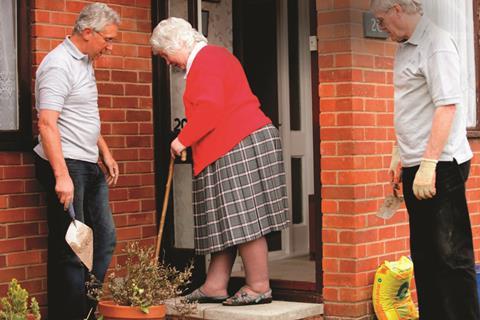Naomi Phillips on how social prescribing can reap benefits in the field of personalised care

What matters to you? What would you like to achieve? What would you like your life to look like in a year’s time?
These are straightforward questions but ones that could be about to usher in a public health revolution.
We all know that, when it comes to our health system, change can be slow to come.
But in recent months there’s been a real shift in attitudes towards the value of non-clinical interventions in improving the nation’s health and a renewed emphasis on the importance of personalised care.
Revolutionising care
It was actually Dr Michael Dixon who said at the Loneliness Action Group conference in June that social prescribing could bring about a “revolution in medicine” and, while he has been championing the benefits of engaging people with community-based activities, groups and services for the improvement of their health and wellbeing for some time, many others are now firmly on board.
Rhian Monteith’s team at NHS RightCare have been exploring ways of reducing reliance on acute care where non-clinical interventions may be more effective and, we at the British Red Cross know from our work that many high-intensity users presenting at accident and emergency are also chronically lonely.
Professor Martin Vernon and the Ageing Well programme have been examining links between loneliness and frailty in both older and younger people.
Social prescribing could bring about a “revolution in medicine”
James Sanderson at NHS England has committed to a new personalised care agenda and the imminent Prevention Green Paper is likely to reaffirm the government’s commitment to using social prescribing to tackle persistent public health issues such as smoking, obesity, loneliness and social isolation.
Already, the government has published a comprehensive loneliness strategy and announced that next year it will start rolling out a programme of social prescribing in England.
One thousand NHS link workers to be embedded in communities up and down the country and tasked with helping people to engage in the sort of activity that will better enable them to live more connected, happier and healthier lives.
This is a big first step – building social prescribing into the architecture of our health system – and it presents us all with huge opportunities to improve people’s lives through genuinely personalised care.
At the British Red Cross, we know that social prescribing works.
The social prescribing plug
An evaluation of our Connecting Communities service – itself a programme of social prescribing designed to tackle loneliness and isolation and delivered in partnership with Co-op – showed that almost 70 per cent of service users were less lonely than they had been following support and that three quarters of them believed their overall wellbeing had improved.
What we have discovered is that stronger interpersonal connections not only help individuals to become more resilient but whole communities too.
And the better connected the community, the more resilient it is, meaning it’s stronger and better equipped to help the people living within it to deal with personal crises when they arise.
One thousand NHS link workers to be embedded in communities up and down the country and tasked with helping people to engage in the sort of activity… to live more connected, happier and healthier lives
The growing consensus around the value of social prescribing and the government and NHS’s decision to put it into practice now presents us with considerable opportunities.
Keen to share learning from the work we have done, the British Red Cross has published 10 areas for action that we feel need to be properly considered if we are to ensure that widespread social prescribing works as successfully as it should do.
Now that we have a commitment to plugging people into activities, groups, and services in their communities, we need to look closely at what exactly social prescribers will be plugging people into.
NHS’s medical referral approach
We hope that, from the very beginning, the NHS’s approach to social prescribing will be:
Proactive in reaching out and finding ways to engage with people who are not receiving statutory support from, say, a GP or health visitor so that they don’t fall through the gaps. There’s an opportunity here to avoid creating a narrow medical referral route to support that excludes the more marginalised and lesser-heard in society such as people from black and minority ethnic backgrounds.
Engaged with local communities. Link workers need to be connected to one another but they are not starting from scratch and they will benefit from working with and learning from organisations operating in this space and have lots of experience of what works.
Constructive in identifying and helping to fill gaps in community provision. We know from our own work in connecting people to their communities that, often, appropriate services simply don’t exist. Now is the perfect time to not only ensure that the services and activities that are already in place are supported and properly funded but that new services are developed to ensure no-one misses out.
Collaborative from the outset and properly embedded in the community. When they get to work, NHS link workers will find an ecosystem of community-based support that they can avail themselves of. It’s important they respect local experience and expertise and work with what’s already out there rather than seek to replace it wholesale.
This may be a revolution but you don’t always need to destroy to create.





























1 Readers' comment